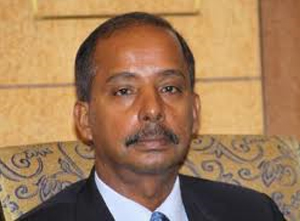 -M.Kulasekaran, MP, June 16, 2013.
-M.Kulasekaran, MP, June 16, 2013.
Reference is made to the statement by Pandikar Amin Mulia, dated on 11th of June 2013, which read: “If you do not come on the first day, is it not an insult (to the parliamentary process?) If they can boycott the democratic system, we will boycott their swearing in.” The statement appeared in The Malaysian Insider on the 11th of June 2013.
Pandikar Amin Mulia has the temerity to make a threat to the Pakatan Rakyat elected representatives of Parliament. As a Speaker whose term that would expire on the 24th of June and with no clear cut signs that he would retain his post, it is galling to witness his arrogance. As mentioned by PKR vice president N. Surendran, under Rule 5(2) of the Standing Order, “…on any day on which the House sits a member who has not previously taken the Oath may present himself at the Table at the time appointed under Standing Order 14, and thereupon the said Oath shall be administered to him and he shall sign the book.” which means that the administration of the oath is the solemn responsibility of the Speaker and that the role of the Speaker itself is to be a neutral voice in Parliament, listening to both sides of the political divide, treat both sides with fairness and exhibit no bias. Pandikar’s threats are a clear abuse of the power bestowed to him by Parliament.
The Federal Constitution does not specifically state the consequences that a Member of Parliament would face if he or she refuses to swear the oath, other than the repercussions of having one’s seat declared vacant, thus it would result in a by-election for the said seat, which effectively creates a situation whereby the same ousted MP is able to re-contest the same seat as many times as he wants and win, as was the peculiar case of Charles Bradlaugh, an English MP for the parliamentary constituency of Northampton.
Bradlaugh, an atheist, had requested the then Parliament of 1880 to allow him to affirm rather than to take the Oath of Allegiance, an oath to God, which contravened his atheistic beliefs. The Parliament, however, did not entertain his request which resulted in him having to forfeit his seat. These events led up to him re-contesting and winning his seat four times in succession.
Allegiance, an oath to God, which contravened his atheistic beliefs. The Parliament, however, did not entertain his request which resulted in him having to forfeit his seat. These events led up to him re-contesting and winning his seat four times in succession.
After his fourth win, in 1886, he was finally allowed to affirm, as well run the risk of prosecution under the Parliamentary Oath Act. This incident had, however, paved the way for a revised Oaths Act in 1888.
If we were to delve into this matter more deeply, the Federal Constitution, as mentioned before, only vacates a seat for an MP who did not swear by the oath; it does not, however, bar the same MP, the party from sending other candidates or even swapping evicted MPs to contest in these seats.
The constitution does not force the resignation of an MP either, as was the case of the Johor Bahru MP, Shahril Abdul Samad, who re-contested his seat as an independent after resigning from it in the 1988 constitutional crisis. This provision in the Federal Constitution was later amended wherein if a member resigns, he is disqualified from being a member of the House for a period of five years starting from the date from which he resigned.
Readers, however, must take note that by not swearing the oath, it does not signify nor constitute that an MP is resigning, as it results in a vacant seat which the MP can re-contest as Bradlaugh did several times.

























good to see Opposition Member vocal.
wish other Members to do the same, other wise voting them in would a waste..!